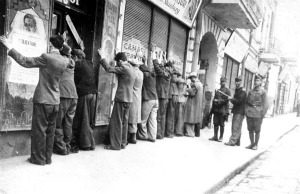When all of the Holocaust speaker guides gathered in the Brown Room prior to the speakers’ arrival, creative writing teacher and Senior Project Coordinator Louise Geczy shared some disappointing news.
Two of the speakers had called in sick and were no longer able to come in.
The Holocaust speaker assembly is an event arranged for seniors in order to teach them about the horrors of the most infamous genocide of the 20thcentury. Each year, Holocaust survivors come in to share their experiences with seniors. This time around, due to the aging speakers and the uncertainty of their return with every passing year, Geczy arranged to have the speakers taped.
“I think there is a greater sense of urgency than in the past. Not only is their age a factor, but some have health issues. Two of the individuals who were supposed to join us this year had to cancel due to health issues. In the past, we have always had good intentions about taping but not followed through on the process. I did not want to have this happen this year,” Geczy said.
“I completely agreed with her [Geczy] that it’s important to document these speakers. I also thought it would be a good exercise for television production students to shoot documentary type footage of these speakers. We’re [Geczy and Schick] still discussing what to do with the over 13 hours of footage,” Schick said.
The two students who volunteered to participate in filming the speakers were seniors Lauren Cook and Misha Fehrmann.
“I filmed the Holocaust speakers
According to Geczy, she took over the program because of her prior experience with a program she instituted at Perry Hall High School.
“…There is no material I have ever taught that has had more of a lasting impact on students than the Holocaust. I think that the life lessons that it contains, the glimpse it provides into a world altering historical event, and the gifts that it can provide to each of us, are unparalleled. I am a better person for having interacted with survivors over the years and I believe my students have been as well,” Geczy said.
According to Geczy, she first became involved with Holocaust studies while working for Baltimore County Public Schools as an English teacher.
“I attended my first teacher workshop sponsored by the Baltimore Jewish Council because I taught ‘Night’ in my gifted and talented sophomore English classes. I heard my first survivor story and something in the program, the historical event, and the people struck a chord deep within me and I knew that this was something I would pursue for the rest of my life,” Geczy said.
While she wasn’t originally sure how to get the survivors to come, she found out that the Baltimore Jewish Council [BJC] could help.
“When I found out the BJC would help me arrange for a survivor to speak to my students, I took advantage of that. Since then, I have attended many workshops and now teach others at them. I have been fortunate to participate in programs in Israel and Columbia and Georgetown as well as interact with numerous survivors and experts in the field of Holocaust studies,” Geczy said.
Geczy contacts the Director of Holocaust Education at the BJC, Jeanette Parmigiani, to act as a middleman to contact the survivors and have them come speak.
“The arrangements for their visits to any school or organization are then handled through the specific school [or] organization. For example, I am currently working with her on a program at Cecil Community College [on] their first ever on Holocaust education that a survivor and I will present their later this month,” Geczy said.
As for the future of the program, Geczy does not have all of the answers yet.
“This is a good question to which I do not have a specific answer at this time. Certainly playing tapes of their stories will be better than simply having to talk about their stories but I think this poses a huge dilemma for everyone involved in Holocaust education. The reality is that this is the end of an era and nothing we do will ever be quite the same. We need to really think about alternative solutions for presentations because the importance of the subject matter does not lessen even if the survivors are gone. In fact, it probably even becomes more important when firsthand testimony is gone,” Geczy said.
Grace Kim is the Online Chief for The Patriot and jcpatriot.com.



